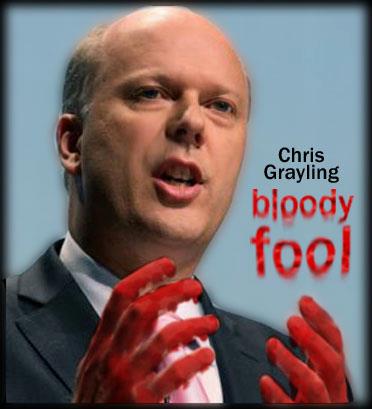
LATEST LINK TO CENSORED VIDEO HERE:
The employment minister Chris Grayling has been accused of trying to censor a Ministry of Justice courts service information video that helps people appealing against decisions to remove their disability and sickness benefit.
Emails and letters between Grayling and MoJ civil servants, seen by the Guardian, appear to show Grayling wanted to remove parts of the educational video, produced by Her Majesty’s Courts and Tribunals Service, giving advice on how to be more successful in the appeals process. Emails from the minister’s account complain about the video’s “tone” and “negative comments” towards the Department for Work and Pensions (DWP) even though the sections in dispute were agreed to be factually true.
The censorship allegations come after Channel 4’s Dispatches programme on Monday alleged that Atos, the firm involved in medically assessing sickness and disability claims, had developed a target culture to ensure enough people were being taken off benefits. The BBC’s Panorama, also aired on Monday, further questioned Atos’s assessment procedures and found one case in which a man died of his serious heart condition five weeks after Atos found him fit to work for the second time. Hundreds of thousands of people have appealed against benefit decisions in the past few years and, according to the latest figures, about 30% are successful.
The Courts service video, which tells claimants to appear in person if they want to be twice as likely to win their appeal, remains offline and the MoJ appears to have instructed YouTube to pull down copies because of copyright infringement.
In the original video posting, senior appeals doctor Jane Parry tells viewers: “Whatever the outcome of your appeal, we hope that you find the appeals process clear, impartial and fair … we will do our very best to help you.”
Complaining about the tone of the video, an email from Grayling’s official ministerial account to MoJ officials on 19 March said: “A couple of times it’s noted that a claimant is twice as likely to win their appeal if they turn up in person – again this is broadly true, but doesn’t help to reduce the opinion that it isn’t the facts of the case that are important, but the turning up in front of a tribunal and pleading their case.”
In a series of ensuing emails, which have been redacted by freedom of information officers, MoJ officials wrote saying they would “temporarily remove the video” while the matter was investigated. Later that day emails from the minister’s account described the video as “offending”, adding: “I raised the things that jumped out as wrong or negative.”
A further email from Grayling’s office read: “I think for the moment we should wait to see what comments they [Ministry of Justice officials] come back with … it may be that we feel the whole tone of the video is wrong and could not be fixed.” After the list of complaints from Grayling’s office was sent to the Ministry of Justice, the department’s parliamentary under-secretary, Jonathan Djanogly, wrote in a letter dated 5 April that he would instruct his officials to remove certain sections of the film even though the statements were not factually in dispute, and would run a copy of the future script of the courts service video past DWP staff.
When asked in a parliamentary question on 10 July by the former Labour Treasury minister Stephen Timms why the DWP had sought to remove the video, Grayling replied: “The department did not direct that the Ministry of Justice video about employment and support allowance appeals be removed from the website YouTube.
“We sought to correct factual inaccuracies within the video which we brought to the attention of MoJ officials who agreed to revise the content of the video.”
After seeing the inter-departmental correspondence Timms told the Guardian the emails appeared to show Grayling’s answer was wrong, adding that the government was “ignoring the needs of disabled people”.
“Many people are finding they have to appeal against wrong decisions on their disability benefits. With cuts to legal aid, it will be harder in future for them to get help. Now DWP ministers are stopping people even from seeing a video that might help them, produced by the Ministry of Justice. They also appear to have given an incorrect answer to my parliamentary question. This looks like a department that is losing its grip and ignoring the needs of disabled people.”
Neil Bateman, from the National Association of Welfare Rights Advisers, who filed the freedom of information request, said the video was typical of public information films produced by the MoJ but the “parts of the video which Chris Grayling objected to were all parts which claimants would find helpful”. “There is the strong impression that this was a deliberate attempt to censor the video.”
The MoJ courts service said: “We are currently reviewing all the information we provide to SSCS [social security courts service] tribunal users and whether a video is the most effective way of reaching our target audience.
“We want to ensure that we provide users with the latest, most accurate and useful information. We also need to ensure that the information reflects all the current DWP procedures, including changes they have recently introduced to their decision-making processes.”
The spokesperson added that information for users was still available on the Ministry of Justice website and that the review of the video content was still “ongoing”.
The DWP said the department’s concerns were about “factual inaccuracies”. “At no point did the department ask for the video to be taken down.”
guardian.co.uk © Guardian News & Media Limited 2010
Published via the Guardian News Feed plugin for WordPress.


No responses yet